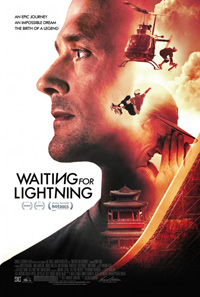Bigger, Faster, Higher: Biography Of Way’s Big Air
 There have been plenty of quality biographical extreme sports docs released in the last couple years, with Jeff Tremaine’s profile of BMX godfather Matt Hoffman, The Birth of Big Air, Stacy Peralta’s loving skate team autobio, Bones Brigade, and even Tristan Patterson’s beautifully unconventional debut, Dragonslayer, but the more the merrier as far as we’re concerned. Jacob Rosenberg’s directorial debut, Waiting For Lightning, stylishly outlines the life of boundary pushing skateboard legend Danny Way by combining elements of retrospective bits with the capping of a career in Way’s attempt to jump the Great Wall of China. The cross cut story is not a complete success, but Way, like many of the skate icons who vet his story, is an enigmatic character of practiced skill and devout will, making for a compelling film filled with fledgling career footage and plenty of big air delirium.
There have been plenty of quality biographical extreme sports docs released in the last couple years, with Jeff Tremaine’s profile of BMX godfather Matt Hoffman, The Birth of Big Air, Stacy Peralta’s loving skate team autobio, Bones Brigade, and even Tristan Patterson’s beautifully unconventional debut, Dragonslayer, but the more the merrier as far as we’re concerned. Jacob Rosenberg’s directorial debut, Waiting For Lightning, stylishly outlines the life of boundary pushing skateboard legend Danny Way by combining elements of retrospective bits with the capping of a career in Way’s attempt to jump the Great Wall of China. The cross cut story is not a complete success, but Way, like many of the skate icons who vet his story, is an enigmatic character of practiced skill and devout will, making for a compelling film filled with fledgling career footage and plenty of big air delirium.
Like many kids taken with the adrenaline of skateboarding, Danny grew up in a broken home. His mother, a drug addicted widow, thought of the local skate park as a daycare for her two sons. One of the youngest talents to come out of the legendary Del Mar scene, Way grew up as a park shredding shorty with some of the biggest names in the sport as contemporaries, pushing him to become one of the best riders on the touring competition circuit, young or not. Names like Tony Hawk, Rodney Mullen and Matt Hoffman are just a few of the many that grew up alongside Danny, each praising the rider for his abilities and his need to push the sport forward, but in conversation many obviously have worries about his personal safety, especially now that he is a father.
Enter, the megaramp – a towering structure built with the intention of sending skaters higher, further and faster than ever before, all from the mind of Danny Way. The ramp itself, opening up the potential for more, far riskier tricks, became a new X-Games event in which Danny has excelled. It showed the world that top skateboarders can be Evel Knievel equivalents, putting their lives on the line to push the limits of their passion. The success of his dream ramp led him to the insane idea of attempting to jump the Great Wall of China. Not only was the idea physically fairly insane, but getting the Chinese government to cooperate seemed a political and logistic nightmare. Yet, Way’s manager’s somehow worked out a deal, sketchy as it seemed, to promote the event as a government sponsored endorsement of extreme sports.
Matt Hoffman captured the irony of the situation perfectly when he said it was “the greatest expression of freedom in a land that is so controlled.” In this moment, Way not only became a temporary beacon of autonomous self propelled passion, but he subverted Chinese authorities in the process, taking multiple runs against their will. It is this heartwarming feeling of American bred pride that allows Waiting For Lightning to hinge on classic talking heads and a rags-to-riches tale we’ve all heard before, yet it still manages to resonate. Skateboarding itself and the network of stoically driven men that continue to make it popular continue to be fascinating characters that all seem to know one another, making it easy to draw out story after interesting story. Funny, the majority of those who will love Rosenberg’s film the most will probably already know all there is to learn from its grainy skate footage, and herein lies the problem. It’s an affectionate bio-doc of big dreams and battle scars with very little mystery or suspense.


